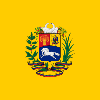Chavismo
Chavism (Spanish chavismo) is the left-wing political ideology based on the ideas, programs and government style associated with the former president of Venezuela, Hugo Chávez.[1] It combines elements of socialism, left-wing populism, patriotism,[2] internationalism,[3] bolivarianism,[4] feminism,[5] green politics,[6] and Caribbean and Latin American integration.[7]
Chavista is a term to describe strong supporters of Chavez, which is closely associated with support for Chavismo.[8]
Policies
Several political parties in Venezuela support chavismo. The main party, founded and led by Chávez, is the United Socialist Party of Venezuela (Spanish: Partido Socialista Unido de Venezuela, usually referred to by the four letters, PSUV). Other parties and movements supporting chavismo include Homeland for All (Spanish: Patria Para Todos or PPT), and Tupamaros.[citation needed]
Broadly, chavismo policies include nationalization, social welfare programs, and opposition to neoliberalism (particularly the policies of the IMF and the World Bank). According to Hugo Chávez, Venezuelan socialism accepts private property,[9] but this socialism seeks to promote social property too.[10] Chavismo also support participatory democracy[11] and workplace democracy.[12] In January 2007, Chávez proposed to build the communal state, whose main idea is to build self-government institutions like communal councils, communes, and communal cities.[13]
Commentary
In The Weekly Standard, Thor Halvorssen Mendoza described the core of Chavismo as a "far-reaching foreign policy that aims to establish a loosely aligned federation of revolutionary republics as a resistance bloc in the Americas".[14]
Noam Chomsky has expressed a certain degree of support for Chavez and his policies, saying that he is "quite interested" by his policies and that he regards "many of them" as "quite constructive". He notes that most importantly, Chavez seems to enjoy overwhelming support from his people after "six closely supervised elections".[15]
According to an article in the New York Sun, Chavezism was rejected in recent elections in Peru, Colombia, and Mexico,[16] and El Universal reports that former Brazilian President Luiz Inácio Lula da Silva distanced himself from Chavezism, saying that Brazil is not Venezuela, and has traditional institutions.[17] However, Luiz Inácio Lula da Silva supported Hugo Chávez in the Venezuelan presidential election of 2012[18] and Lula also supported Nicolás Maduro in Venezuelan presidential election of 2013.[19]
The Nation noted on its editorial pages that:
"Chavismo is not an adequate description of the social movement that makes up Chávez's political base, since many organizations predate his rise to political power, and their leaders and cadre have a sophisticated understanding of their relationship with Chávez. Over the last couple of years, a number of social scientists have done field work in urban barrios, and their findings confirm that this synergy between the central government and participatory local organizations has expanded, not restricted, debate and that democracy is thriving in Venezuela.
Chavismo has ripped open the straitjacket of post-cold war Latin American discourse, particularly the taboo against government regulation of the economy and economic redistribution. Public policy, including economic policy, is now open to discussion and, importantly, popular influence. This is in sharp contrast to Costa Rica, where a few months ago its Supreme Court, with the support of its executive branch, prohibited public universities from not just opposing but even debating the Central American Free Trade Agreement, which soon won a national referendum by a razor-thin margin."[20]
See also
References
- ^ Morsbach, Greg. Chavez opponents face tough times. BBC News (6 December 2005).
- ^ ""El chavismo es el patriotismo"". Diario VEA (in Spanish). 25 June 2012. Retrieved 3 February 2014.
- ^ "El internacionalismo de Hugo Chávez" (in Spanish). Ola Bolivariana. 18 March 2013. Retrieved 6 March 2014.
- ^ Jaua, Elías (8 December 2013). "El chavismo" (in Spanish). TeleSUR. Retrieved 3 February 2014.
- ^ "Chávez se declaró feminista". El Periodiquito (in Spanish). 6 July 2012. Retrieved 6 March 2014.
- ^ ViVe (8 November 2012). "Si el planeta quisiera acabar con el ser humano, ya lo hubiera hecho… ¿Podemos evitarlo?". Retrieved 6 March 2014.
{{cite news}}: Missing|author1=(help) - ^ Fraija, Farith (20 December 2012). ""El chavismo es un bien colectivo del pueblo, que ha demostrado defender a toda costa su continuidad"". Noticias24 (in Spanish). Retrieved 3 February 2014.
- ^ VHeadline.com | Politics & Culture: An anthropological perspective on Venezuela's political confrontation
- ^ Sivaramakrishnan, Arvind (6 March 2013). "Hugo Chávez: Death of a socialist". The Hindu. Retrieved 3 February 2014.
- ^ Salmerón, Víctor (13 June 2012). "Plan Chávez prevé crear 30 mil empresas de propiedad social". El Universal (in Spanish). Retrieved 3 February 2014.
- ^ "La democracia participativa es un concepto chavista". Correo del Orinoco (in Spanish). 16 November 2013. Retrieved 3 February 2014.
- ^ Albrecht, Hermann (29 May 2009). "Chavez Calls on Workers to Push for Workplace Democracy in Venezuela". Venezuelanalysis.com. Retrieved 3 February 2014.
- ^ Azzellini, Dario. "The Communal State: Communal Councils, Communes, and Workplace Democracy". North American Congress on Latin America. Retrieved 3 February 2014.
- ^ Halvorssen, Thor (9 August 2005). "Hurricane Hugo". The Weekly Standard. Retrieved 6 July 2013.
- ^ Santora, Marc. "Chomsky is Alive, Actually, and Hungry for Debate", The New York Times.
- ^ Barone, Michael. Good News. The New York Sun (31 July 2006).
- ^ Lula says he is not like Chávez. El Universal (22 August 2006).
- ^ Weisbrot, Mark (9 October 2014). "Why Chávez Was Re-elected". The New York Times. Retrieved 6 March 2014.
{{cite web}}: CS1 maint: year (link) - ^ Pearson, Tamara (3 April 2013). "Ex Brazilian President Lula Supports Venezuela's Maduro". Venezuelanalysis.com. Retrieved 6 March 2014.
- ^ Chavismo and Democracy, By Greg Grandin, December 6, 2007
Bibliography
- Ramirez, C.V. (2005), "Venezuela's Bolivarian revolution: Who are the Chavistas?", Latin American Perspectives, 32(3), pp79-97


